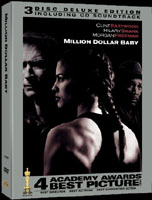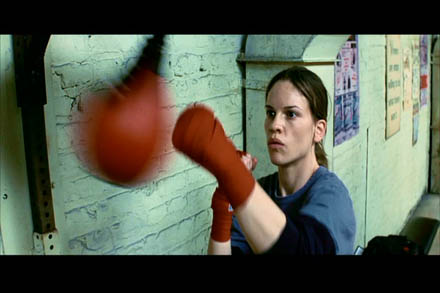 BUY IT AT AMAZON: CLICK
BUY IT AT AMAZON: CLICK
HERE!
STUDIO: Warner Home Video
MSRP: $39.98
RATED: PG-13
RUNNING TIME: 132 Minutes
SPECIAL FEATURES:
• Full Soundtrack on disc 3
• Born To Fight
• Producers Round 15
• James Lipton Takes on Three
If I
were living in a different time, Million Dollar Baby would probably
become my entry into the concept review netherworld. In one corner, we’d have a
concept of the flick as pure, satisfying cinema; in the other would be the
alternate vision, where the movie is overly predictable and perhaps consciously
calculated to win awards. I’d be in the middle, trying to make them play nice.
Thankfully, Brent DiCrescenzo and Pitchfork have self-aggrandized the concept
review into oblivion, so I don’t have to go there.
And you
know what? It doesn’t matter anyway. Twist endings and high concept have
apparently ruined the ability to appreciate that it’s not where you’re going,
but how you get there. We need a movie to emphasize classic storytelling, and
Million
Dollar Baby is it.
The Flick
The
first thing an audience sees is an old-fashioned WB logo in rich black and white.
For some people it could be considered a welcome mat; for others it’s a
warning. Million Dollar Baby celebrates a style of filmmaking that has
almost disappeared. It doesn’t rely on attention-grabbing camerawork or
self-consciously glib dialogue. There’s nothing fashionable contained within. For me,
that makes it incredibly refreshing, but even unaffected by that bias, this is a
deep story, elegantly told.

They don’t
get much simpler than this. Frankie (Eastwood) runs a gym – the Hit Pit – in
the bowels of LA. Eddie (Morgan Freeman)is his right-hand man. Frankie thinks
he’s pretty jaded to the downside of boxing, but he’s actually afraid to give
his fighters the reins, which costs him a managerial gig with an up and coming
member of The Nation’s Punched.
Maggie
(Hilary Swank) is a poor white girl who’s been vainly training in the back
corners of the Hit Pit. (Like Don Lockwood in satin shorts: gotta fight!) She
wants Frankie’s help, but he’s not much interested. He doesn’t train girls. Her
determination changes his mind, of course, and Maggie turns out to be a pretty
bad-ass fighter. In the grand old boxing tradition, she’s got nothing to lose.
And that’s pretty much it.
.jpg)
Except
that it’s not. These people have decades of history behind them. Some of it is
implied, like Frankie’s relationship with his daughter. Other situations, like
Maggie’s family life, are more explicit. As the movie languidly unwinds that
history comes to bear on some difficult, even devastating decisions. It’s then
that Eastwood’s movie becomes something much more than the type of genre
picture that Barton Fink was supposed to write.
When
Eastwood is on, he’s a master of characterization. Here he’s very much on. The
major cast is drawn in broad strokes, then filled in over time, so that we feel
that we’re always learning about each person. These are all people who are, in
one way or another, at the end of their lives, and Eastwood and writer Paul
Haggis realize that the story moves as we discover the depths of each
character.
It
never feels forced. Over the course of the film the admittedly melodramatic
setup smoothly becomes a situation full of very real people. It’s alchemy, and
is beautiful to watch. With everything in place, Million Dollar Baby is like
living the memories of a person who accepts that the good old days were
sometimes unbearably awful.
.jpg)
Haggis does make one crucial mistake, and it’s
the reason my support for the film wavers even slightly. Rather than letting
things play naturally, the film is narrated by Eddie. I can see why the voice
over is there: the film is based on prose by F.X. Toole, and Haggis wrote many
of his words into the script. They’re poetic and often beautiful in their
matter-of-fact description of boxing. And as intoned by Morgan Freeman, who
could resist?
This
would be a better film if Eastwood had been able to do so. While the narration
makes the film more accessible, even friendly, it doesn’t need the help. As a director, Clint is more than capable of
communicating all the essential detail through image and dialogue. Voice over
is, at best, redundant, and the small payoff isn’t enough to balance the extra
sentiment introduced every time Freeman speaks. Letting the story play on its
own terms would give Million Dollar Baby license to truly live in
the spare, resonant world it creates.
9 out of 10
The Look
In
recent years, Warner Brothers has become a studio we can rely on for good,
solid DVD transfers. This film is no exception. Eastwood isn’t afraid to use
low light, or to subtly shade his scenes with unexpected tinges of color, and
the disc captures it all. Each time I see the movie I admire it’s restrained,
elegant appearance even more, and the transfer really shows off all the
delicate details hidden in boxing’s brutality.
9 out of 10
The Noise
I can’t
remember a more quiet, even-toned film getting major release in a long time.
This soundtrack definitely does the original justice, however. The dialogue is
rich and lively, with a weighty low end. When Eastwood’s gentle, emotional
score comes in, it does so unobtrusively, but in a way that really reinforces
the film. Loud moments in the boxing ring don’t overwhelm the balance, even
when the shrill sound of a bell goes off. This disc is a real pleasure to
listen to.
9 out of 10
The Goodies
This is
where the disc falls on its face…by which I mean this is perhaps the worst ‘deluxe edition’ I’ve ever seen. One of the three discs is a standalone soundtrack. What happened to the days when great films might get a soundtrack-only audio track? Clint does some solid music for the film (I’m listening to it
as I write) but if I wanted the soundtrack, I’d buy it. Shave that off and
you’ve got a two-disc set. And the only special feature on the first disc,
aside from a very solid film, is Québécois subtitles. In reality, the special
features reside only on the second disc.
.jpg)
In one
of the most embarrassing moves I’ve seen lately from the Warners DVD
department, none of these features are remotely special. Born to Fight and
Producers Round 15 are non-insightful shorts which spew the same old EPK
quotes and anecdotes which pollute so many DVDs these days. Want to know
anything about F.X. Toole, author of the source material? Forget about it. How
about learning what percentage of his prose made it into the voice over? Uh-uh.
James
Lipton Takes on Three, despite sounding like something that might happen in a convention hotel room,
is slightly better, only because it’s twice as long as the other shorts. But
subtract every moment of Lipton’s embarrassing sycophantia, and a 25-minute
running time is suddenly chopped to five.
.jpg)
Bottom
line: this is a transparent ploy to pad out an Oscar champion to special
edition status. Whether you buy the two-disc ‘normal’ version or this deluxe
edition is immaterial. With these features, Warners has barely got a
single-disc release on their hands.
1 out of 10
The Artwork
I
didn’t like this image when it was promoting the theatrical release, and I
don’t like it now. There’s just no real character to it; if I didn’t know
anything about the movie, I’d pass on it based on this cover. Give points for
not enlarging the heads on the poster to fill the DVD cover, but even that
isn’t enough for a winning score.
4 out of 10
Overall: 8 out of 10